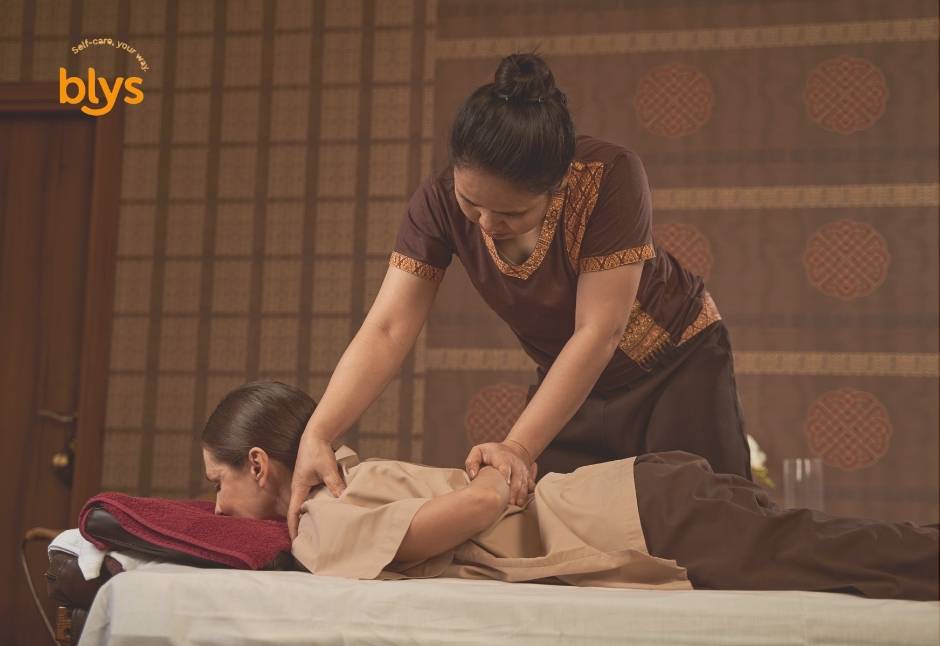
Unlock the Healing Power of Thai Massage: Flexibility, Relaxation, and Relief—But Are There Risks?
Thai massage is a time-tested therapy known for easing muscle tension, boosting circulation, and promoting deep relaxation. But before you book your next session, it’s important to understand both the benefits and potential risks. Keep reading to learn how to approach Thai massage safely and how Blys can help you find the right therapist for a worry-free experience!
What is Thai Massage?
Thai massage is an ancient practice that blends deep pressure, stretching, and acupressure to help relieve muscle tension, improve flexibility, and promote overall relaxation. Unlike traditional massages, it’s usually done on a mat on the floor while you remain fully clothed in loose clothing. The therapist uses their hands, elbows, knees, and feet to apply pressure along energy lines and gently stretch your body. It’s designed to not only ease physical tension but also help restore balance and boost circulation, leaving you feeling relaxed and rejuvenated. Explore our in-depth guide on Thai massage.
What are the risks of Thai Massage?

Although Thai massage has many benefits, there are also some risks to consider, particularly if performed incorrectly or if you have certain health conditions. Here are some of the most common risks associated with Thai massage:
1. Skin Issues and Infections
If the massage is performed in an environment that isn’t hygienic, there’s a risk of skin irritation or infection. This is especially important if the skin is broken, or if the client has cuts, rashes, or open wounds. Always ensure that the therapist is working in a clean and sanitary space.
2. Spinal Injuries
The deep stretching and pressure applied during Thai massage can sometimes put strain on the spine, especially if the therapist uses incorrect techniques or applies excessive force. People with a history of spinal issues, such as herniated discs or scoliosis, should avoid or consult with a healthcare provider before trying Thai massage.
3. Physical Injuries
Because Thai massage involves intensive stretching, it can lead to strains or sprains if not done correctly. People with limited flexibility or muscle strength are at higher risk for injury, especially if the stretches are too deep or too intense.
4. Nerve Damage
Incorrect application of pressure or improper positioning during a Thai massage can potentially irritate or damage nerves. For individuals with pre-existing nerve conditions, such as sciatica or neuropathy, caution should be exercised to avoid worsening their symptoms.
5. Blood Clots
Individuals with a history of blood clots or conditions like deep vein thrombosis (DVT) should avoid Thai massage. The pressure applied during certain moves can increase the risk of dislodging a clot, which could lead to life-threatening complications.
6. Psychological and Emotional Concerns
Thai massage can be intense and may cause emotional discomfort for some people, particularly if the deep pressure triggers emotional responses or past trauma. It’s important to communicate with your therapist about any concerns or emotional reactions you experience during the massage.
7. Undiagnosed Health Conditions
If you have an undiagnosed health condition, such as a hernia, circulatory problems, or muscle imbalances, Thai massage may aggravate these issues. Always consult with a healthcare provider before trying Thai massage if you’re unsure about your health status.
8. Lack of Regulation
In some areas, Thai massage therapists may not be well-regulated, which means there’s a lack of standardization in terms of training and technique. It’s essential to ensure that the therapist is properly trained and certified to minimize the risk of injury.
9. Overstimulation
Thai massage is physically intense, and for some, the deep stretches and pressure can feel overwhelming or overstimulating. This is especially true for those who are new to the technique or have chronic conditions like fibromyalgia or arthritis. Always communicate with your therapist if you experience discomfort or if the pressure is too intense.
10. Misleading Medical Claims
Some Thai massage practitioners may make exaggerated claims about the health benefits of the therapy, such as curing chronic diseases or improving overall health in unrealistic ways. It’s important to approach any therapeutic modality with realistic expectations and not to substitute it for proper medical care.
Is Thai Massage Painful?
Thai massage is not inherently painful, but it can be intense. The combination of deep pressure and stretching may cause discomfort, particularly if you’re not accustomed to these techniques. It’s important to communicate with your therapist about any discomfort or pain during the session. The therapist should adjust the pressure or techniques according to your comfort level to ensure a relaxing experience.
How Can You Approach Thai Massage Safely?
To ensure a safe and effective Thai massage experience, keep these guidelines in mind:
1. Choose a Qualified and Certified Therapist:
Make sure your therapist is properly trained and certified in Thai massage techniques. Certified professionals understand the proper application of pressure and stretching and can adjust their techniques to meet your individual needs.
2. Consult with Your healthcare provider:
If you have any existing health conditions, such as back issues, blood clots, or nerve problems, consult with your healthcare provider before trying Thai massage. They can provide guidance on whether it’s appropriate for you.
3. Communicate Clearly with Your Therapist:
Open communication is key. Let your therapist know if you experience any discomfort, pain, or have any concerns during the massage. A professional therapist will adapt their technique to ensure you feel comfortable.
4. Listen to Your Body:
Always pay attention to how your body feels during and after the massage. If you feel light-headed, dizzy, or sore, speak up immediately. It’s important to stop the session if anything feels wrong
How Does Blys Help You Find a Professional Thai Massage Therapist?
Blys makes it easy to find a qualified and experienced Thai massage therapist. Through Blys Mobile Massage, you can book an appointment with a certified professional who specializes in Thai massage, all from the comfort of your own home. Whether you’re looking to relieve muscle tension, improve flexibility, or simply relax, Blys ensures that you receive expert care with a therapist who is trained in the art of Thai massage.
Blys Mobile Thai Massage offers the convenience of at-home treatments, so you can enjoy a relaxing session without needing to travel. You’ll be matched with a therapist who tailors the massage to your needs, ensuring you get the best possible experience in a safe, comfortable environment.




